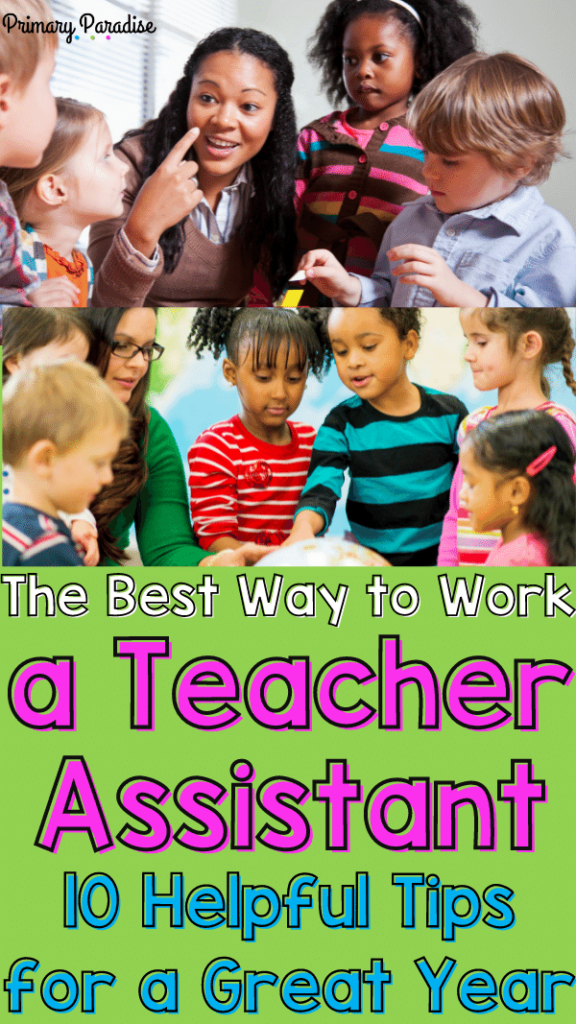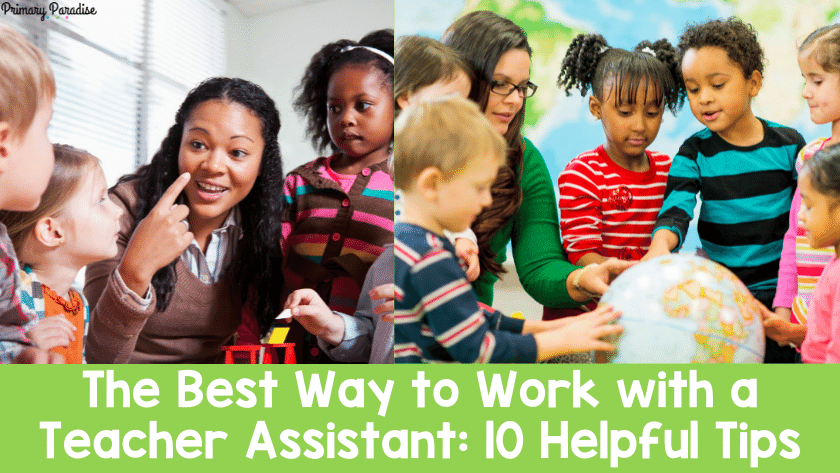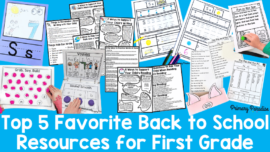If you’re lucky enough to work with a teaching assistant or helper teacher in your classroom, the possibilities are endless. It is such a gift. However, it can be daunting if you’re not sure how best to manage things or work together. It can feel awkward telling an adult what to do, and it can feel uncomfortable if you don’t have good communication. Luckily, there are some simple things you can do to make it a really great and effective experience for all involved. Here are 10 tips for working with a teacher assistant.
10 Tips for Working with a Teacher Assistant
1. Start by discussing expectations
First, I highly recommend sitting down and talking about both of your expectations before school starts. Talk about things like what they feel comfortable doing, what things they don’t feel comfortable doing, what things you need help on, what you are hoping for from the year, and what they are hoping for. It’s very important to be upfront, clear, and honest. If there are certain things you really want them to help with, let them know. If you have pet peeves about certain things, say talking during instruction time, tell them. And, be sure to listen to their expectations as well.
It can be helpful for both of you to take notes and come up with some agreements. For example, making sure to text the other if you’re running late, or using a certain signal if one of you needs support with a student. When you come into the relationship with a clear understanding, it can help clear up miscommunications later.
2. Utilize strengths and support weaknesses
When discussing your expectations, take time to find out about your teacher aide’s strengths.
- What things are they passionate about?
- What skills and hobbies do they have that you might be able to utilize?
- What types of tasks and activities are they able to do quickly and easily?
Last year, I had an amazing teacher assistant who was a graphic artist in the past. Knowing this, I asked her if she’d be comfortable using those skills in our classroom, and she was. She taught multiple art lessons to the class which were incredibly valuable to our students. She often would draw things for anchor charts for me because she enjoyed it and she was great at it. Since I knew she was growing more comfortable sharing with the class, when we talked about cultural celebrations, she was able to share about Eid with the children. If I had just relegated her to menial tasks, my students wouldn’t have benefitted from her knowledge, passion, and expertise.
On the other hand, it’s helpful to learn what tasks and things they don’t feel comfortable with. That doesn’t mean that, if they hate filing, you can never ask them to file. But, instead it lets you know where you should provide extra support. For example, if fractions are a weakness, you can take some time to teach it to your assistant before so they can still support students. If they struggle with understanding certain science concepts, you could send them the instructional video you’re using in your lesson early. If they aren’t sure the best way to put up a bulletin board, you can guide them through the first one. And, if there is something that they just feel like they can’t do, you can try to be sensitive to this and come up with an alternative plan.
3. Teach them your behavior and classroom management style
One of the biggest issues I’ve heard from teachers is that their aide or assistant doesn’t handle behavior issues in the same way they would like it handled. The thing is, everyone handles behavior differently. It’s important to be very clear with your expectations. Be sure to take some time to clearly explain how behavior and classroom management works in your classroom. If there are certain things you always do or you never do, explain that. If you have a written copy of your procedures, you can share that as well. It’s unfair to be frustrated with your helper teacher with how something is handled if you don’t make your expectations clear.
4. Make a plan for communication
Things will inevitably come up that you need to communicate. While, of course a conversation work, it’s also helpful to have a system for sharing communication. I often just tell my assistant if I need something, but I also have a Google doc with a link to my plans for the week (I change this weekly) and then a table with the days of the week.
There is a column for weekly tasks (for example every Friday she put papers in folders) and then a column for one time things (put up a border or take pictures for Seesaw). Then, there is a column for her to write notes and questions to me. It is very simple, but it works. I try to update it on Monday morning for the week, and it gives my assistant a chance to see a bit of how the week is unfolding. You can find my very simple Google Docs template for free here.
5. Listen to feedback
A really helpful thing about having a teacher’s aide is that they can see your classroom from a new perspective. They will likely see things you are doing or students are doing that you did not. Be willing to listen to feedback. Keep an open mind, and remember that the goal is to help your students thrive and learn. There are a number of things last year that my helper teacher picked up on that I didn’t see. From needing to move certain seats to kids who were struggling with a concept but were copying those around them. We are not omnipresent. We can’t see everything. So, be open to feedback. It will benefit your classroom and students.
6. Assume good intentions
This is number one with building relationships with students. The same applies for building a relationship and working with your teacher assistant. This should go both ways. Assume that everyone involved is trying their best and avoid jumping to conclusions. When you work closely with a teacher’s aide, there are bound to be mistakes and miscommunications. If all parties can assume good intentions, it makes those moments much easier to work through.
7. Share your lesson plans
I alluded to this one above. Even if your teacher helper will not be doing much related to instruction, it is helpful for them to have access to your plans. Why? It let’s them know how the day and week will go. It makes it much easier if there’s a substitute and they need to provide extra support. And, of course, if they are (and hopefully they are) providing student support during instruction, it gives them the chance to be prepared. They might not always look at them, but it’s definitely helpful for them to have access to them.
8. Let them make your job easier
Having an assistant, at least in my experience, is rare. Until last year, I never had another adult in the room with me. That meant I was it. So, when I had an assistant for the first time, I was elated. Besides meaning I could use the bathroom if I needed to, I had a whole person to help in our classroom!
Let your teacher assistant help make your job easier. Listen to their strengths, and then delegate. They can do administrative things to save you time such as bulletin boards, taking pictures for Seesaw, and filing. They can help support struggling learners while you’re teaching a whole group instruction. One of my favorite things was that small group time meant I had another person to work with students. Giving up a little control and delegating tasks benefits your students and makes your job easier.
9. Tackle issues at the source
This is a big one. If and when conflicts arise, go right to your teacher’s helper. Don’t spend time gossiping to other people. This is likely to make the issues much more difficult to handle. If it gets back to your teacher assistant that you were talking about them, it will make solving the problem that much more difficult. If a conflict arises, go directly to them and work it out together. This post about helping students resolve conflicts can apply to adults in many ways as well.
10. Laugh together and move on
Lastly, laugh together. When you have a ridiculous day, laugh. If (when) the students are all over the place, wait until recess and then laugh. When you have a miscommunication, work it out and then laugh it off. The friendship I developed with my teacher assistant was so valuable to my mental health, and I believe hers as well. We are not only colleagues, but friends. I can’t guarantee that your teacher’s assistant will become your bestie, but it still helps to laugh it of together.
Keep reading and learning:
- 10 Things Teachers Can Do on Friday for an Easier Monday
- Why I Love Having a Proud Board in my Classroom
- Why It’s Important to Review the Alphabet in the Beginning of First Grade




